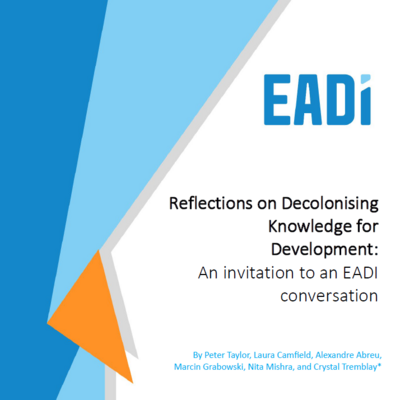New EADI Reflection Paper on Decolonising Knowledge for Development
An invitation to an EADI conversation
Many who believe Development Studies was born from a colonial mindset also perceive this mindset continuing to this day. Calls to decolonise not only Development Studies, but social sciences more broadly and beyond (including the natural and applied sciences), have grown louder in recent years. But it is also possible to see Development Studies as driven by an anti-colonial mindset from its emergence in the ferment of 1950s/1960s independence movements and orientation towards global solidarity. So, is Development Studies a neo-colonial endeavour, an anti-colonial endeavour, or a shifting, transforming and, sometimes, perplexing combination of both? How does this inform how, and under which contexts, development is pursued? And what are the implications for EADI’s engagement in efforts to decolonise knowledge for development?
In a period of intense global turbulence, this seems an important time for EADI to reflect on such issues, given it is an Association which brings together a diverse array of organisations, people, histories and perspectives. Its members bring a wealth of different influences and experiences of coloniality, located within the context of Europe which, itself, continues to evolve and change. Indeed, it is important to learn from ways in which citizens in a range of different national contexts experience emergent forms of colonisation, as well as those with longer historical antecedents. There is a need to be conscious of the dangers of EADI’s attention to these issues now as being perceived as yet another form of intellectual colonisation. EADI therefore represents an incredibly valuable resource of knowledge and experience to help inform and shape collective thinking around processes and approaches that can support decolonisation without reproducing it in yet new ways.
As EADI approaches that significant moment, what do others feel about the ideas and potential actions shared above? What suggestions, evidence, insights, and concrete proposals would others like to bring to this conversation? This is the invitation to discuss and contribute. Read the paper


